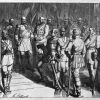The Weimar Republic
Farewell to the German question – Looking back at the long journey West: 1919–1933 The Weimar Republic.

There was in fact considerable continuity between the German Reich and the Weimar Republic, which emerged following the fall of the monarchy in November 1918 and the January 1919 elections to the German National Assembly, which was to draw up a constitution. To a certain extent the institution of the monarchy simply persisted in a different form: The office of Reich President, who was elected by the people, came with such powers that there was very quickly talk of a “substitute Emperor” or a “replacement Emperor”.
Nor was there any ethical break with the German Reich. The question of responsibility for the war was not addressed in a serious manner even though (or because) Germany’s actions spoke a very clear language: Following the assassination on June 28, 1914 in Sarajevo of the successor to the Austrian-Hungarian throne, the leaders of the Reich deliberately escalated the crisis and therefore bore the main responsibility for the outbreak of the First World War. The subsequent lack of debate about bearing the blame for the war resulted in the German legend that the country was indeed innocent of starting the war. Together with the the „stab-in-the-back-legend (which claimed that treason on the home front had led to Germany’s defeat) this played a part in the undermining of the first German democracy.
Almost all Germans saw the Treaty of Versailles, which Germany was forced to sign on June 28, 1919, as a blatant injustice. This was primarily as a result of the territories the country had to cede, in particular to the newly established Poland, to material hardships in the form of reparation payments, the loss of colonies, and the military restrictions, all of which were justified by citing the guilt of the German Reich and its allies for the Great War.
The fact that Austria was forbidden to unite with Germany was likewise considered to be unjust. Once the downfall of the Habsburg monarchy had removed the major obstacle to a solution for a greater Germany, the revolutionary governments in Vienna and Berlin (Berlin in the “Golden Twenties“) had spoken out in favor of the two German-speaking republics uniting. They could be assured of the popularity of the demand in both countries.
The fact the Treaties of Versailles and Saint Germain forbade the union did not, however, prevent the notion of a greater Germany once again gaining momentum. It went hand in hand with the renaissance of the old idea of the Reich: Especially because Germany had been beaten militarily and was suffering from the consequences of defeat, it was receptive to the lures that emanated from a past seen through rosy eyes. The Holy Roman Empire in the Middle Ages had not been a nation state but rather a supranational structure with universal claims. After 1918, forces on the political right, who attributed a new mission to Germany, made increasing reference to this legacy: In Europe, they suggested, it should establish itself as the upholder of law and order in the struggle against Western democracy and Eastern Bolshevism.
As a parliamentary democracy the Weimar Republic survived a mere 11 years. At the end of March 1930, the last majority government, headed by Hermann Müller, a Social Democrat, collapsed on the back of an argument about restructuring the unemployment insurance system. The Grand Coalition that had been in power until then was replaced by a center-right minority cabinet under a politician from the Catholic Zentrum Party, Heinrich Brüning. From the summer of 1930, this government ruled with the help of emergency decrees issued by General Field Marshall Paul von Hindenburg, the aging Reich President.
When at the Reichstag elections held on September 14, 1930 Adolf Hitler’s Nationalist Socialist Party (NSDAP) became the second biggest party, the Social Democrat Party (SPD), which was still the largest party, decided to tolerate the Brüning cabinet in order to prevent the Reich drifting further to the right and to preserve democracy in Prussia, the largest individual state, where the SPD ruled jointly with Brüning’s Catholic Center Party, and the center-right Democrats.
Following the transition to a presidential system of emergency decree, as a legislative body the Reichstag had less influence than during the constitutional monarchy of the German Reich. The decreased influence of parliament meant that to a large extent the electorate no longer played any role in the running of the country, and it was precisely this that gave a boost to anti-parliamentarian forces on the right and left. Of these the National Socialists benefited the most. From the point in time when the Social Democrats supported Brüning, Hitler was able to present his party as the people’s only alternative to all forms of Marxism, the Bolshevist just as much as the Reformist. He was now in a position to refer to both: to the widespread resentment of parliamentary democracy (which indeed had by now well and truly failed) and to the people’s secured claim to participation in the shape of universal and equal suffrage, which they had enjoyed since the days of Bismarck and which had been rendered politically ineffective by the three presidential governments of Brüning, Papen and Schleicher in the early 1930s.
Thus, Hitler became the greatest beneficiary of the dissynchronic democratization of Germany, namely the introduction of democratic suffrage well before that of a parliamentary system of government.


